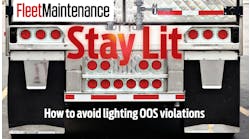Weighing a tragedy against the greater good that ultimately results is never an easy proposition. And yet it can be argued that every emergency vehicle on the road in America today is safer because of the deaths of three Connecticut firefighters in the 1980s.
The accident took place in a city called Waterbury, when a piece of reserve fire equipment was called up for front line service. The maintenance department knew the truck had a brake problem, but after an inspection had decided that the repairs could wait until after the fire call…
"This was the first fire truck accident involving fatalities that the National Transportation Safety Board (NTSB) investigated," says Steve Wilde, president of Elmhurst, IL-based Certified Fleet, a maintenance provider that specializes in emergency vehicles. According to Wilde, NTSB then spent several years investigating fire truck and ambulance accidents, and came to the conclusion that 85 percent of those accidents were caused by a lack of maintenance, or poor quality maintenance.
This stark assessment prodded the Apparatus Maintenance Section of the International Association of Fire Chiefs (IAFC) to take action. "At that point, the Apparatus Maintenance Section said, 'That's what we're here for, to try to fix these kinds of problems,' says Wilde. "They felt that the best way to do that was to develop a technician certification process that would mirror ASE (National Institute for Automotive Service Excellence) but would be technically appropriate to fire trucks."
According to Wilde, the Apparatus Maintenance Section of IAFC started developing a certification program in 1988, and offered its first certification exam in 1989. In 1992, the certification program was incorporated as the Emergency Vehicle Technician Certification Commission (EVTCC), although it is still operated by the IAFC. In 1994, Wilde became president of EVTCC (a post he still holds today), and the organization moved to Dundee, IL. Under Wilde's leadership, the organization has developed a training, testing and certification process that would be the envy of any fleet.
NOT YOUR ENEMY
"When the program was first developed, there was a pretty close-knit organization of fire technicians from around the country—the Apparatus Maintenance Section—that was pretty adamant that we needed something to recognize the technician and to get out this message that vehicle maintenance isn't your enemy, even though it costs you money," says Wilde. "In the end it saves you money, and it puts better, safer operating equipment in the hands of the people who need it to save lives and protect property."
From all indications, EVTCC has been very successful at getting that message out. This past August, the group announced that EVT certifications had been granted to 56 technicians across the country, and in the wake of new tests that were administered nationwide on October 14, many more will be added to the rolls soon.
One reason the program is so successful is that it is designed to complement ASE technician certifications. An emergency vehicle technician can pursue certifications for emergency vehicles only, but to become a Master Technician, then he or she must also pass ASE certification tests.
"We developed our tests around fire apparatus specifically, and we modeled them after ASE," Wilde explains. "We entered into an agreement with (ASE), so we use ASE Certifications for our levels of certification, but we certify in individual areas, too. For instance, if you take a fire pump test and pass it, you're certified to work on fire pumps, and after you get so many EVTs then you can add ASEs to them and get what we call 'Level Certified' and go all the way up to a Master EVT. There are about 400 Masters now out of about 10,000 Certifications we've given.
"We injure a lot more firefighters going to and from calls than we do on the fireground," Wilde says. "There are a lot of vehicle accidents. More and more of them are preventable if we can train operators better. Maintenance has become a huge issue in our industry, and EVTCC has been able to continually challenge the technicians to learn more and be better prepared for the jobs we have to do."
YEAR-ROUND TRAINING
A network of state and regional fire and emergency vehicle technician associations, technical colleges, and vehicle and component providers host training classes for emergency vehicle technicians across the country, ensuring that technicians can find the training they need, no matter where they live and work.
And we're not just talking about an afternoon class here or there. This is serious training: for example, the City of Redmond, Washington's Fire Department holds an annual week-long training school for EVTs from around the state. The Washington State Fire Apparatus Maintenance Conference is held every September, and regularly attracts 150 or more emergency vehicle technicians who are preparing to take their EVT Certification exams.
Frank Moffat, maintenance program supervisor for the City of Redmond Fire Department, has seen the state conference grow from a small Detroit Diesel and Allison Transmission training meeting, first held in 1980, to the week-long extravaganza it has become. This year's event was budgeted for 125 attendees, says Moffat, but 160 attended.
"Being a person who started with EVTCC back in the '80's, I believe in following their certification guidelines, so we can make sure our people are up to date with what's going on in our industry," explains Moffat.
"We need the training, and it's the biggest training we do all year, and it's concentrated on what we really deal with," he continues. Consequently, the most popular classes at this years' event covered Allison Transmissions, and turbo training for the 7.3 and 6.0 International Power Stroke engines. The next most popular were the managerial track class and the NFPA update class, followed by aerial replacement and repair class, a foam class from Pierce, and an MSA breathing air class.
TRAINING GOALS
After attending classes like these, technicians should be ready to apply their knowledge to their work and their EVT Certification exams. But the Commission doesn't make it easy.
"We continually update our program, and write new questions," Wilde says. "We have a once a year validation conference, where we invite all the Masters Technicians to come, as well as industry experts, educational people, and manufacturers. We do statistical analysis of the questions that are being asked, and review the tests and make sure that the learning objectives match the questions, and then write new technology questions, so we are constantly updating our question banks, and constantly keeping up with technology and changes in the industry."
According to Wilde, there is no requirement that technicians must be EVT Certified, but the NFPA's maintenance standards are now so high that technicians must be "qualified," and the best way to be qualified is to be certified. "NFPA standards would never say that you have to be EVT Certified to meet the qualifications, because they're into performance qualifications," he says. "For instance, if you had to repair a charging system, what NFPA would like to see is that you do a performance test to prove that you can repair this charging system. Which is kind of a nifty way to do things, but, very honestly, with technicians, you're talking about thousands of skills and tasks to do what seems like a simple thing… so it would be very hard to do skills testing."
EVTCC has stayed away from skills testing for that reason. In Wilde's words, "Skill testing would be great, but it doesn't prove basic competency. The next best thing is knowledge testing. With technicians, knowledge is skill. The manual dexterity to operate a wrench or a screwdriver or a power tool does not change much between an apprentice and a Master. What changes is the knowledge that he applies. So, the application of your knowledge is what increases your skills as a technician."
Wilde's philosophy is that knowledge testing is the only fair way to test someone's ability to do his or her job, because there is no bias. In a skills test, he says, someone is timing the person taking the test, and whenever another human being enters into the process, there is the potential to affect the outcome of a skills test. A technician who takes a knowledge test, in contrast, passes or fails based purely on the answers he or she has given to the questions.
"That's what I mean by fair," he concludes. "This is the standard; this is the bar. Everyone starts out on a level playing field, and there's no human intervention to affect the outcome."
CAREER LADDER
Many emergency vehicle technicians use their EVT Certification to give them an advantage in climbing the career ladder, as some cities, municipalities and independent repair shops tie pay raises and promotions to Certification. At Wilde's independent shop in Elmhurst, for example, technicians get pay raises for every Certification test they pass.
"The Certification is the carrot at the end of the stick," says Wilde. "What we want them to do is be better technicians, because they picked up a book, or sought out the information, prepared for an exam and were successful.
"But even if you're not successful, you've gained knowledge," he continues. "Maybe next time you'll be better prepared for it. The whole point is to get them to learn things that they need to know to do their job properly, effectively and efficiently. The urgency and the need for us to have qualified technicians is very, very important in this business."
PAY RAISE
Batallion chief Mike Fonzi of the Oklahoma City Fire Department certainly feels that urgency.
"Most of the time, when we go out with an open technician position, we start out with either a mechanic or a (ASE) Master Technician, because you can hardly find any (EVT) fully-Certified vehicle technicians," Fonzi says. "In 1992, we got with our personnel office and our finance department to advance our emergency vehicle technicians one more step above Master Technician. They have to hold an ASE Master Technician Certification for heavy or light vehicles, and then they also have to qualify for the EVT. They have a particular test they have to take for EVT just dealing with fire trucks."
Fonzi won approval from the city personnel and finance departments to increase the pay of EVT Certified technicians above that of ASE Master Technician, on the argument that NFPA requires a higher standard. So far six of his 11 technicians have chosen to follow this career path.
"We felt we needed to get them more pay, because their knowledge level is higher than what's needed to become a Master Technician," he says. "They can work towards the next level, in terms of career development and pay. It's good for my folks, because we send them to different classes to pass the exams, so they can gain that knowledge and get promoted for more pay."
Fonzi explains that the Oklahoma Emergency Vehicle Technician Association (OEVTA) holds free training classes every quarter. These training events are held in Oklahoma City and other cities throughout the state, and offer classes focusing on such hot topics as aerial maintenance, multiplex systems and diagnostic tools. In addition, OEVTA and the Texas Association team up once a year to put on a training convention. And these events aren't just for Oklahoma and Texas Emergency Vehicle Technicians—Fonzi says that technicians come from as far away as Wisconsin to take the classes.
Perhaps that's why the EVT Certification program is so successful: the classes are that good. Fonzi has just hired two new technicians, and he's already started sending them to OEVTA classes.
"The technicians love their classes," he says. "They make their job a lot easier. The old troubleshooting light's not working anymore."
TRAIN IN PAIN
Unfortunately, the training picture isn't so rosy in some cities. Bill Malcolm, manager for Metro Nashville and Davidson County, TN, describes his training efforts as "painful."
"In reality, we do not have a good training facility," he says. "We're taking advantage now of training from Pierce, E1, and outside sources for factory-type training. We get those in here quite often. But It's painful…
"It's difficult in two ways," he goes on. "One, to be able to pull the guys off the shop floor to do the training, and the second is to get the (factory trainers) here. The painful part is that there is an expense. I can't get any vendors to foot the bill on their own. We have to pay for their travel and lodging when they're in town. But we do that out of necessity, and because it's the right thing to do for our folks.
"I'll give you my best example," he says. "We have so many units moving into the multiplex world, and we have to train our guys on multiplexing, because that's what's happening as the standard now on the apparatus side of the fleet. So I just signed a P.O. to bring someone into town for a three day, in-depth training class."
Some fleet maintenance managers have discovered another hitch in the EVT Certification program: it can create inequality in the workplace. Steve Wilde encountered this when he introduced the program to his union shop and had to convince the technicians that without the Certifications, the company couldn't compete.
Bill Malcolm learned a similar lesson when he took over as manager of fleet operations two years ago for Metro Nashville and Davidson County, TN. Malcolm already had a dozen EVT Certified Master Technicians on staff, but when the City of Nashville consolidated its fire and rescue fleet with the rest of the city fleet he had to reconcile two different pay and benefit packages.
"When we were consolidated, part of the problem was people want to stay in their own stovepipes," he explains. "EVTs were all associated with the Fire Halls, so that created some issues. They had a different benefits package than a regular metro civil service employee. But they're in a good spot because every one of the EVTs has dual role: they're EVTs, and they're Master Technicians for medium and heavy duty vehicles."
ISSUES ASIDE
These issues, important as they are, don't detract from the essential value of the EVT Certification program.
"Maintenance has become a huge issue in our industry," says Steve Wilde. "EVT has been able to continually challenge the technicians to learn more and be better prepared for the jobs we have to do.
"Fire service is very unique," he explains. "It's a brotherhood. After 9/11, I think everyone in America realized that firefighters from LA to NYC, and from Anchorage to Honolulu are brothers. And the technicians are part of that brotherhood—they have the same dedication, and the same attitude towards their jobs. This is not just a job; it's a calling. We realize that we're an integral part in the firefighters' lives, and their safety."
For more information, go to evtcc.org



